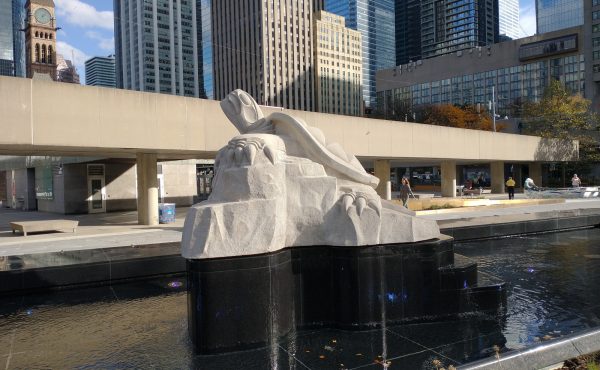
It was difficult not to think about the nature of civic leadership last week, what with New York mayor Mike Bloomberg serving as the face of a metropolis enduring a calamity of unprecedented proportion. Politicians in those situations are always surrounded by their top officials. But they are nonetheless called upon to lead the response, make tough calls (e.g., cancelling the N.Y. Marathon), and reassure the public in circumstances that can be exceedingly challenging.
It is impossible to imagine Mayor Rob Ford — who spent last week torching the few remaining crumbs of his populist brand — rising to such an occasion; we can only hope he will never have to do what Bloomberg did this week. Yet the calamity serves a reminder that mayors, at times, are expected to do far more than cut taxes, search for rounding-error waste, and coach football teams.
How much more? Have a look at the terrific interview with Bloomberg published in this month’s Atlantic. In many ways, he is just the sort of entrepreneur the brothers Ford profess to admire: sidelined at Salomon Bros. early in his career, he invented an electronic information service for traders. As Bloomberg terminals become ubiquitous on Wall Street and elsewhere, his company revolutionized both the stock market and business journalism. He made a fortune (over $25 billion) and could have retired to the Hamptons for a cosseted life of yachts and golf.
Yet Bloomberg decided to pay it forward, and turned his attention to the city that he loves without reservation, first through philanthropy and then via politics. In Bloomberg, writes The Atlantic’s James Bennet, one sees “a guy…who thinks for himself, but not only of himself” — “think” being the operative word here.
Bloomberg is the anti-Ford. Both his style and his record, to my mind, set the standard for what Torontonians must demand from their next mayor (more on this in a moment). After the reality show of the Ford mayoralty, nothing less will suffice.
First, style: As he did on Wall Street, Bloomberg has sought maximum transparency, sitting at a desk without walls in the middle of an open space full of his officials. He rides the subway. He talks to the media constantly. Though he is not a glad-hander, he unreservedly embraces his city’s diversity. And he speaks his mind. After the Denver massacre, he alone called for tougher gun laws, a career-limiting move for a sort-of Republican. After last week’s hurricane, he endorsed President Barack Obama because of his position on climate change, of all things.
His record in office is extensive and bold, and includes dramatic changes in public space and environmental policies, as well as controversial moves to restrict salt, fat and sugar in New York restaurants. Indeed, Bloomberg has poured tens of millions of dollars into public health initiatives and research; I think it would be reasonable to conclude that he doesn’t regard the NYC’s public health department as a warren of socialist entitlement led by over-paid bureaucrats.
But from where I sit, Bloomberg’s most singular achievement is the Applied Sciences Initiative by New York’s Economic Development Corp. The Big Apple has long lacked a world-class engineering and technical university, so Bloomberg two years ago launched a fascinating experiment to not only fill the void but also kick-start the city’s tech sector on a grand scale. Bloomberg’s plan was to offer $100 million and city land (Roosevelt Island and two other sites) to universities or consortia of research institutions prepared to invest big bucks in a top-notch campus/incubator capable of challenging Stanford/Silicon Valley and MIT/Boston.
The competition attracted 18 international bidding groups, and NYEDC unveiled the winner last spring: a $2 billion proposal from Cornell, in partnership with Israel’s Technion, renowned for technology commercialization. But the city also decided to back a second project for Brooklyn, proposed by a group that includes NYU, Carnegie Mellon and the University of Toronto. The Centre for Urban Science and Progress has a mandate to investigate the “science of cities” and develop technologies designed to sustainably accommodate the world’s increasingly urbanized population. According to Bloomberg’s economic development officials, “new research and technologies developed at the Center are expected to generate $5.5 billion in overall economic impact and 7,700 jobs over the next three decades.”
Now contrast this to the Ford administration’s flagship economic development scheme: a casino multiplex, likely to be located either on the Metro Toronto Convention Centre lands or at the CNE. As a staff report coming to today’s Executive Committee session claims, the project could create somewhere between 2,700 to 5,600 new ongoing jobs and additional revenues of $76 to $195 million.
There it is, writ large: thinking very big, and thinking very small.
If you’re a croupier or an addiction counselor, the city’s future looks bright. Talented scientists and entrepreneurs, however, should probably look elsewhere.
In a recent Toronto Life essay on the need for renewed urban leadership for the city, Richard Florida unsparingly sets out the long-term risks of pursuing Ford’s “anti-urban” agenda. But he told me last week his warnings have fallen on deaf ears, with barely a peep by way of response from Bay Street and the corporate elites.
“Many Torontonians including our business leadership claim to want Toronto to be a great global city like London or New York,” Florida said in an email. “But they say nothing about the casino, nothing about the mayor. They just want it to somehow `happen.’ I cannot understand the failure of the business community to speak out. The mayor is ruinous to them – he and his policies hinder and hamper their ability to attract talent. How do they not see this? Why don’t they speak out? Why do they acquiesce?”
Maybe they, too, missed the bus.
photo courtesy of the Prime Minister’s Office Flickr





15 comments
Toronto residents are silent too and it’s not in their best interest. As we all squeeze closer together without a master plan for the public realm we are only putting off dealing with the impacts of intensification. Not good!
This may make too much sense for Toronto to handle.
The comparison to NYC is interesting because they have a governor who is pro-casino and a mayor who sees casinos for what they are: a regressive tax. Part of the proposal for the Coney Island revitalization could include a casino if Cuomo gets his way, a move which Bloomberg has called a way of further hurting an already hurting neighbhourhood and separating people from their money
NYC also has the cautionary tales of Atlantic City, racinos (slots & horseracing), and Foxwoods all around them. The Times has done some pretty meticulous reporting on this, Foxwoods in particular: http://www.nytimes.com/2012/03/18/magazine/mike-sokolove-foxwood-casinos.html
Excellent Article John. I would offer one correction. Rob Ford may be going along for the ride, but the casino proposal for downtown Toronto is an initiative of the Ontario Government and the Ontario Lottery and Gaming Corp. This leadership failure belongs primarily to Dalton McGuinty. Your main point, however, is well taken and I couldn’t agree more. Compared to his counterparts in other major cities, Ford’s leadership in economic development leaves much to be desired.
While the 2nd Avenue subway is being built and being funded jointly by all levels of government, Bloomberg is also extending the 7 subway line using only city funds (as a percentage of the sales tax being added on).
Bloomberg also did NOT hand out his business cards when he visited the disaster areas of New York City.
“If you’re a croupier or an addiction counselor, the city’s future looks bright. Talented scientists and entrepreneurs, however, should probably look elsewhere.”
I’ve been thinking about this a lot recently. For people like me who are still starting their careers and are free to move around, sticking around in Toronto is looking like a horrible option. Before Ford, we were doing okay even though we were already lagging behind decisions that should have been made to further our potential and really work towards becoming the great city Toronto could be. Now, after two years of the Ford administration undoing the progress from before and stalling on new decisions, we are so far behind it’s going to take a very long time to come back from this.
I was born and raised here, and I would love to stick around and start a family. But the cost is too high, the opportunities too slim, and quite frankly I just need to live in a city that can keep up with its own pace of growth.
While I agree with the author’s assessment of Rob Ford’s time in office, I’m not impressed with Mayor Bloomberg either. Yes, the media makes him look good, but what do you expect. He’s a total insider. One of them. PLU. His “accomplishments” are mostly spin created by his own gang of insiders. Whatever you think of Rob Ford, you have to concede that he is NOT popular with the media cabal.
@Luca. Technically, you are correct. But ask yourself why this only came up after David Miller left office. The OLG, which is very much a Tory shop, somehow knew it would get a positive reaction from the M.O. And it did.
@QATZELOK: Can you share any data to back up those assertions? I don’t dispute that Bloomberg is far from perfect. For one, I’m not sure how ethical it is to have bylaws ammended so that you can run for a third term. And it is questionable how much authority the city should have in determining what you can put in restaurant food.
But he can genuinely point to a lot of accomplishments: in addition to investments in transit and infrastructure (see above), New York city has balanced its budget, and the city is getting safer and cleaner statistically (http://en.wikipedia.org/wiki/Michael_Bloomberg#Mayoralty). He’s on the right side of the immigration debate, understands why we have taxes (and more importantly why and when they should be raised or lowered). In response to a potential transit strike, instead of calling for lazy workers to be fired, or talking about unions ‘taking the city hostage’, he responds forcefully but with humour:
“Bloomberg has had a less cordial relationship with unions as mayor. In 2002, when New York City’s transit workers threatened to strike, Bloomberg responded by riding a mountain bike through the city to show how the city could deal with the transit strike by finding alternate means of transportation and not pandering to the unions.”
Even if he doesn’t (and shouldn’t) take full credit for his successes (unlike Ford, *cough* Woodbine Live *cough*), he’s demonstrated that he has good sense, that he’s a sensible administrator, and most important of all: that he dearly loves the city he represents as mayor. If only we could say any of that about Ford.
@QATZELOK: One more thought. Do you not think that part of why Rob Ford is not ‘popular with the media cabal’, is because he’s so fervently secretive and hard to work with? Because I don’t see Ford’s media outsider status as something to be proud of; I see his dysfunctional relationship with the media as a serious deficiency for any politician.
Those in the media who cover city politics have to report on the opinions and actions of elected officials. Since he was elected, Rob Ford has kept his schedule secret (breaking with tradition); he has been more absent from council than any mayor since amalgamation; he has called 911 on the CBC; he has threatened Daniel Dale with physical violence; he has characterized the media at large as a ‘bunch of whiny kids’ (his brother decided to use more colourful language).
If you had to work with someone like this everyday, someone who went out of his way to be secretive, belligerant, dismissive, and disrespectful (and proud of it), what would your working relationship resemble?
Lee, while I don’t disagree with any of the pleasant things about NYC’s mayor you have written, they aren’t exactly his own ideas. Investing in transit and “being on the right side of the immigration debate” are both media constructs. The appropriateness of the transit investments in NYC are as questionable as Mayor Ford’s proposed investments.
And in the immigration debate, there is no “correct” side (except in totalitarian countries). In non-totalitarian countries, there are only opinions. Bloomberg obviously says he agrees with his friends in the media – the ones who put him where he is. Billionaire mayors are very good to other billionaires, especially the ones who own news chains. And they return the favor.
New York is a banking hub drowning in its own excess. Let’s not forget the role that moneyed nepotism and celebrity media had in creating this mess.
The article is meaningless, the people of the Toronto never had nor will they ever have the opportunity to vote for Bloomberg. The choice they had was Ford or Smitherman and they chose correctly. If this is an article to prod a local businessman or woman to step forward in the next election then you should call out said individuals rather than wax philosophically…
@QATZELOK: While I agree that Bloomberg did not origniate the idea of investment in transit, he nevertheless still endorses the more sensible policy position. New York desperately needs more rapid transit along Second Ave; everyone has recognised this for the last 60 years.
“Investing in transit and “being on the right side of the immigration debate” are both media constructs. The appropriateness of the transit investments in NYC are as questionable as Mayor Ford’s proposed investments”
I don’t think they are as questionable. The Second Avenue subway line was first proposed in the 1920s, because the Lexington line was crowded and the elevated railway above Second Ave was a dangerous and old disaster. Successive crises have delayed its construction, but there is definitely the density to support it, and both New Yorkers and the MTA agree the city needs it. I’m not sure how this qualifies as a media construct. Urban planners have been in near total agreement that the area to be served by the Second Avenue subway will provide more than enough ridership to justify its presence. As for the cost of tunneling deeply under such an established city as New York, I don’t know if it could be done more cheaply, I’m not an engineer. Taras Grescoe’s book ‘Straphanger’ has some interesting things to say about the construction, but I won’t get into them here.
The Sheppard subway, meanwhile, is proposed for a low density neighbourhood, where ridership is projected to be below the threshold that qualifies for subway service even 30 years from now. More annoying from my perspective is that proponents for the Sheppard subway insisted it could be built for cheaper than most estimates, and that they proposed diverting funds for LRT construction projects that would replace service on overcrowded bus routes like Finch.
“Bloomberg obviously says he agrees with his friends in the media – the ones who put him where he is. Billionaire mayors are very good to other billionaires, especially the ones who own news chains. And they return the favor.”
I don’t think there is evidence of a media conspiracy to empower Bloomberg. He was elected mayor by the citizens of New York. Three times. It’s more what he does, than what he says, which is important.
“And in the immigration debate, there is no “correct” side (except in totalitarian countries). In non-totalitarian countries, there are only opinions”
That’s true, but there are arguments to support opinions which must be considered before adopting policy. That currently non-status people should receive status, and hence start contributing to the tax pool, and voting, strikes me as the more sensible position, both from a social and a fiscal perspective. I’m yet to hear a convincing argument against opening paths towards citizenship for people that desperately want to live and work in New York.
“New York is a banking hub drowning in its own excess. Let’s not forget the role that moneyed nepotism and celebrity media had in creating this mess”
We clearly differ on our perspectives of New York. I see a vibrant mix of cultures, stunning architecture, and economic opportunity. I see the best example of a functional metropolis I’ve ever experienced in North America. I see an economy built on financial services that is diversifying in a sensible way.
I don’t deny that there is moneyed nepotism in New York. And there is certainly an element of celebrity media constantly seeking to provide cheap enthrallment. But that nonsense can be opposed and overcome.
“I don’t deny that there is moneyed nepotism in New York. And there is certainly an element of celebrity media constantly seeking to provide cheap enthrallment. But that nonsense can be opposed and overcome.”
Likewise, every public institution in Toronto has been corrupted by big money and the masses of people have been dummed down by commercial media, to the point where “the conversation” regarding urban governance sounds like it’s coming from children who went to a good grammar school. There is no attempt to address the nepotism and inequality that ultimately leads to poor governance.
No one is willing to out the construction industry/banking industry/media on being the mafia crap that they are. In the meantime, most commentary in media – including alternative media – amounts to mafia spin. Or slick denial of the major flaws with our power structures.